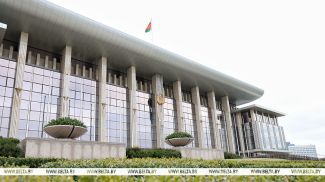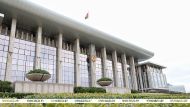MINSK, 14 May (BelTA) – Belarus President Aleksandr Lukashenko has signed laws on preventing the rehabilitation of Nazism and amending the laws on counteracting extremism. Both laws had been passed by the Belarusian parliament and are registered in the national registry of legal acts of the Republic of Belarus, which means they have been signed by the head of state, BelTA has learned.
Close attention has always been paid to preventing the rehabilitation of Nazism in Belarus. Tougher responsibility for spreading Nazism and its manifestations was introduced by the bill on amending the laws on stepping up fight against Nazism propaganda. The bill expanded the law on counteracting extremism, the Administrative Offences Code, and the Criminal Code of the Republic of Belarus, which came into force on 1 February 2020.
Yet it was decided that efforts to prevent Nazism rehabilitation need a separate dedicated law. The need is explained by the special significance of the problem for Belarus.
The Republic of Belarus suffered colossal damage due to actions of Nazi Germany and its allies during World War Two, which followed the ideology of national socialism. Racial, national, and religious intolerance was central to the ideology of national socialism.
Despite that far-right ideas have gained traction in Belarus at present. Events of the past are misrepresented. Pseudohistorical articles are published online to justify Nazi criminals and their accomplices. They represent a potential threat to the national security of the Republic of Belarus.
The law on preventing the rehabilitation of Nazism is designed to comprehensively regulate the counteraction of these negative manifestations. The law reaffirms and builds up on the provisions previously stipulated by the law on counteracting extremism.
Apart from that, the Criminal Code has been amended and expanded for the sake of proper legal protection of relations relating to the counteraction of extremism and rehabilitation of Nazism as a manifestation of extremism.
For instance, the rehabilitation of Nazism is now regulated by a separate norm. Propaganda, public demonstration, manufacturing and distribution of Nazi symbols and attributes are now criminalized. People, who commit such acts more than once, will face criminal prosecution.
Criminal prosecution has been introduced for participation in an extremist formation.
Taking into account modern challenges and threats criminal prosecution has been adjusted for calls to take actions designed to harm the national security of the Republic of Belarus and for financing extremist activities.
The Criminal Code has been expanded with new articles to punish those who aid and abet extremist activities. Training or other kinds of preparations for participation in extremist activities will be punished. Failures to execute decisions that recognize an organization or actions of a self-employed businessman as extremist will be punished as well.
Thus, the adoption of the law on preventing the rehabilitation of Nazism and the appropriate adjustment of other laws and regulations will create a complex set of measures meant to counteract attempts to rehabilitate Nazism.
On the whole, the law is designed to establish comprehensive legal and organizational foundations for efforts meant to prevent the rehabilitation of Nazism.
With this in mind the law prohibits the rehabilitation of Nazism or assistance with the rehabilitation of Nazism in any way, shape, or form. The rehabilitation of Nazism is understood as public actions that justify the ideology and practice of Nazism, approve of or deny the crimes committed by the Nazi. The rehabilitation of Nazism is also understood as actions that glorify Nazi criminals and their accomplices.
The law also specifies the terms “Nazi criminals” and “accomplices of Nazi criminals”.
The scope of the existing term “Nazi symbols and attributes” has been expanded. It now covers symbols and attributes of the organizations that cooperated with the organizations, which are recognized as Nazi ones.
Entities in charge of counteracting the rehabilitation of Nazism have been specified. Those are police, state security bodies and other law enforcement agencies, justice bodies, the National Academy of Sciences of Belarus, a number of central government agencies and municipal authorities.
The scope of the work of the entities in charge of counteracting the rehabilitation of Nazism and the authority of other government agencies and other organizations in this sphere have been determined.
The law also determines the main directions for preventing the rehabilitation of Nazism. Those include efforts to inspire intolerance towards Nazism in the general public, the creation of information products for preventing the rehabilitation of Nazism, the monitoring of legislation observation, efforts to counteract the rehabilitation of Nazism in the course of immortalizing memory of the fallen, efforts to glorify the victory in the Great Patriotic War of 1941-1945.
Measures designed to counteract the rehabilitation of Nazism are also stipulated. A list of such measures and the procedure for applying them are the same as the measures designed to counteract extremism.
Another law has amended the law on counteracting extremism.
It defines the term “extremist formation” as a group of citizens, who are involved in extremist activities or provide assistance with such activities or finance such activities.
Simultaneously the more narrow term “extremist group” has been discarded.
The term “extremist symbols and attributes” has been introduced. It includes Nazi symbols and attributes among other things.
The list of government agencies in charge of counteracting extremism has been expanded. It now includes justice bodies, financial investigation bodies, a number of central government agencies and municipal authorities.
Law enforcement agencies will take care of coordinating efforts of the entities in charge of counteracting extremism.
The government will keep lists of organizations, formations, self-employed businessmen, and citizens, who are involved in extremist activities. Among other things these lists will help make decisions on deportation, denial of entry, termination of citizenship, restriction of the right to occupy certain posts (civil service, military service), restriction of the right to perform certain activities (teaching, publishing, activities relating to the legal turnover of weapons and explosives).
In addition to the prosecutor general prosecutors of the oblasts and the city of Minsk have been vested with the authority to suspend the operation of organizations and file applications with courts in order to recognize organizations as extremist and terminate their operation.
The Civil Procedure Code defines how fast courts have to process cases on recognizing an organization as an extremist one, on liquidating an organization, on recognizing symbols, attributes, information products as extremist materials. Courts will have to finish such cases within one month of accepting the relevant applications.
The main provisions of the laws signed by Belarus President Aleksandr Lukashenko will come into force in one month after their official publication.












